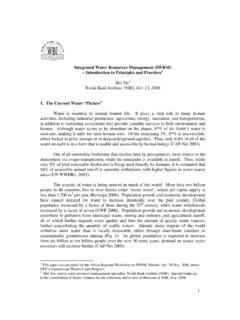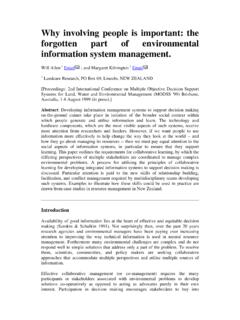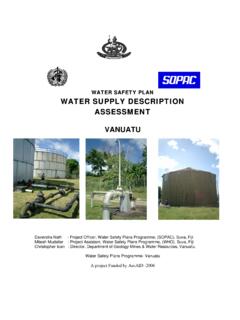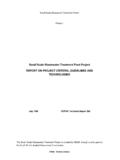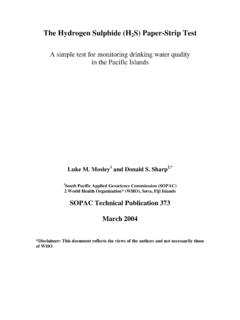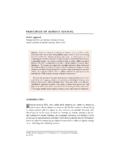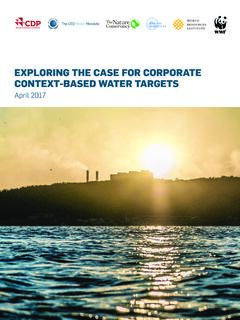Transcription of Philippines: National Water Resources Board
1 Country Paper National Water Sector Apex Body Philippines: National Water Resources Board I. Brief description of the Philippine National Water Resources Board structure and function The National Water Resources Board (NWRB) was created in 1974 as the government coordinating and regulating agency for all Water Resources management development activities. It is tasked with the formulation and development of policies on Water utilization and appropriation, the control and supervision of Water utilities and franchises, and the regulation and rationalization of Water rates. Its objective is to achieve a scientific and orderly development of all Water Resources of the Philippines consistent with the principles of optimum utilization, conservation and protection to meet present and future needs. The laws defining the role of the NWRB are Presidential Decree 424 (1974), creating the Water Resources Council or NWRC, which is now NWRB; the Water Code of the Philippines (1976); the Constitution of the Philippines (1987), Executive Order No.
2 124-A (1987) which converted NWRC to NWRB; PD 1206 (1977) which assigned the residual functions of the Board of Waterworks and the defunct Public Service Commission to NWRB. The Board membership as reconstituted per 123, is composed of heads of the departments and agencies with no direct claims on Water Resources : Department of Environment and Natural Resources (DENR); National Economic and Development Authority (NEDA), the Department of Justice (DOJ), Department of Finance (DOF), Department of Health (DOH), National Hydraulic Research Center, University of the Philippines (UP-NHRC) and the Executive Director of National Water Resources Board (NWRB), as the head of Secretariat. The Board , presided by the Secretary of DENR as Chairman, meets every month to define policies and to resolve all issues and conflicts in Water Resources development and management .
3 The Board is supported by a fulltime working staff composed of specialists in the different aspects of Water Resources as well as administrative support personnel. The staff headed by an Executive Director, is composed of some 65 engineers, scientists, economist and legal specialist and some 49 administrative, financial and technical level support personnel. (Organization Structure as Annex A ) The jurisdictional powers, functions and duties of the Board as provided for in the NWRC Charter (PD 424 of 1974), Water Code of the Philippines (PD 1067 of 1976) and PD 1206 of October 6, 1977 are as follows: a. Formulate and adopt policies and guidelines on Water Resources development and management consistent with the National development plans; b. Effect inter-sectoral/inter-departmental coordination of Water Resources plans and programs within the context of National plans and policies for social and economic development; The views expressed in this paper are the views of the authors and do not necessarily reflect the views or policies of the Asian Development Bank (ADB), or its Board of Directors or the governments they represent.
4 ADB makes no representation concerning and does not guarantee the source, originality, accuracy, completeness or reliability of any statement, information, data, finding, interpretation, advice, opinion, or view presented. 2c. Regulate and control the utilization, exploitation, development, conservation and protection of the country s Water Resources ; d. Adjudicate and grant Water permits and Certificate of Public Convenience/Certificate of Public Convenience and Necessity for the operation and maintenance of Water utilities and services, impose penalties for administrative violations thereof and make all decisions and determinations provided thereof; e. Supervise and control all Water utilities and their franchises, equipment and other properties and regulate and fix Water rates to be charged by waterworks operators except those falling under the jurisdiction of the Metropolitan Waterworks and Sewerage System, and the Local Water Utilities Administration; f.
5 Exercise original jurisdiction over all disputes relating to Water appropriation and utilization and Water rates of above mentioned Water utilities; provided that decisions of the Metropolitan Waterworks and Sewerage System as well as the Local Water Utilities Administration on Water rates cases involving Water districts under its jurisdiction shall be appealable to the Board ; g. Review and approve rules and regulations prescribed by any government agency that pertain to the utilization, exploitation, development, control, conservation or protection of the country s Water Resources ; h. Impose and collect reasonable fees or charges from Water appropriators and public utility operators which shall be used for the purposes deemed by the Board to be necessary for achieving the purposes and objectives; i.
6 Advise and appraise the National Economic Development Authority on matters pertaining to Water Resources development plans, programs and projects; The practice of Integrated Water Resources management (IWRM) in the Philippines is not a new concept. In 1976, moves were made to bring a more holistic perspective to Water resource development and management . The birth of IWRM as a policy direction can be traced through policies on Water Resources management as embodied in several enabling laws starting with the creation of NWRB. II. Describe briefly what the NWRB has accomplished so far in terms of facilitating and overseeing Water sector reforms in the last 5 years A. Policy, Coordination and Development Functions The Philippine Government has enunciated the comprehensive development, utilization, conservation, and protection of Water Resources , notably in the 1987 Phil.
7 Constitution, the 1976 Water Code of the Philippines, and the 1977 Environmental Code. To implement these policies, Water Resources management functions were distributed among numerous government agencies such as the Metropolitan Waterworks and Sewerage System (MWSS), Local Water Utilities Administration (LWUA), Department of Local and Interior Government (DILG), Department of Environment and Natural Resources (DENR) and Department of Health (DOH). And the overall management of the Water resource is the basic mandate of the National Water Resources Board (NWRB). ( Water Related Agencies Organization Structure as Annex B ) B. Inter-Agency Coordination In addition to coordination provided through its own Board , NWRB is continuously active in several other ad hoc or permanent inter-agency bodies that address issues and coordinate activities in Water sector.
8 These include: 3(i) the Water Crisis management Committee, which assesses the Water situation on a regular basis, and makes recommendations to NWRB on reservoir management and related matters; (ii) the Sectoral Committee on Infrastructure Development, reviews infrastructure programs for Water Resources Sector with Regional Development Council; (iii) Joint Operation and Maintenance Committee on Flood Forecasting and Warning System for Dam Operation, enhances warning capability of management offices of major impounding reservoirs in the country as regard to Water releases and general flooding situations; (iv) Environmental Impact Assessment Review Committee to assist the Environmental management Bureau (EMB) in the review of Environmental Impact Studies; (v) Philippine Economic- Environmental and Natural Resources Accounting; (vi) TWG on Water Supply and Sanitation Performance Enhancement Project; (vii) Steering Committee on Extreme Climatic Events (ECE); and (viii) Agno River Basin Development Committee (ARBDC).
9 C. Water Action Plan and Sector Strategies One of the functions of the Board provided is to formulate and adopt policies and guidelines on Water Resources development and management consistent with the National development plans. As the coordinating and regulating government agency for all Water development activities in the country, NWRB acts as a lead convenor in the implementation of the workshops, conferences and consultations on various Water issues, coordinates with Water -related agencies, academes, NGOs and other stakeholders, provides secretariat services and propose recommendations to achieve sustainable management practices that would provide affordable Water adequate for all needs, including disposal. Among the recent National consultations that were conducted by the NWRB are as follows: National Consultation on Water Sector Mapping and Visioning; Workshop on Water Resources management in the Philippines Vision to Action; Workshop on the Philippine Program for Action in the Water Resources Sector; Workshop towards a sustainable Water supply within the framework of Water Resources management ; National Water Forum 2004.
10 D. Water Resources Assessment and Planning With so many agencies in the country that are involved in Water data collection, the NWRB has been responsible in the following activities: The UNDP-funded Groundwater Data Bank and recently installed in NWRB-links LWUA, NIA and NWRB and provides an important illustration of what could be developed nationally. Operation of National Water Data Coordination Center (NWDCC) in order to provide a statistical overview of existing Water Resources data nationwide. Operation and maintenance of NWRB Information Center involving the acquisition of technical and legal books and literatures indispensable for the Board s operation. Implementation of Water Resources Development Projects. - National Water Data Collection Network for Groundwater, Surface Water and Water Quality - National Water Information Network 4 For the past years, the NWRB has accomplished the following activities to achieve a sustainable development and management of Water and related land Resources : Conducted a Master Plan Study on Water Resources Development in the Philippines; Conducted Fast-track solutions to Water use conflicts; - Increase collection efficiency; - Reduce illegal extraction of Water .
